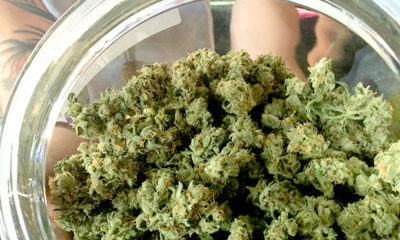
Medical
Worker’s Comp Claims Down in Medical Marijuana States
Study finds cannabis helping with pain cuts down on worker’s comp claims.
For the working-class schlub who, by definition, is considered an above-average cannabis connoisseur, it can sometimes be challenging to find and maintain gainful employment. The great American nine-to-five has, for decades, deemed it unsafe for the country’s stoner sect to report to work looking like a freshly drawn cartoon. Companies have long since thought that people who consume marijuana before or during work suffer a level of impairment that prevents them from being productive, as well as puts the safety of them and their co-workers at risk. It’s one of the main reasons that marijuana is one of the first substances they look for in a drug screen. Capitalistic society, the squares, the man, whoever is at the wheel of this whirling money machine, is simply doing its best to keep the cannabis user down by making it impossible for them to relish in reefer and continue earning a living. Or maybe we’re just being paranoid.
But what if we were to tell you that there is evidence out there suggesting that the legalization of marijuana is contributing to fewer serious workplace injuries? Would that be something of interest to you? Of course, it would — what are you, high? Otherwise, you would have already bailed out of this article and went on to mindlessly scour the World Wide Waste of Time for the latest cat memes. (By the way, feel free to send us the good ones. Some of us get bored at work, too.)
Unlike everything else that keeps showing up on the Internet, it appears that weed might be safe for work. A recent study published in the journal Health and Economics finds that worker’s compensation (WC) claims are down a smidge in states that have legalized marijuana for medicinal purposes. The study, which utilized data from the Annual Social and Economic Supplement to the Current Population Survey, shows workers in states with medical marijuana laws are nearly 7% less likely to file for worker’s compensation than those grinding it out in areas of total prohibition.
It’s a number that might not seem worthy of much fanfare. Still, considering that there are millions of non-fatal accidents occurring on the job site every year, any sliver off the top should be regarded as a victory.
Researchers at Temple University say the slight decrease appears to be happening because more employees with access to cannabis are dealing with minor pain issues with it as opposed to other drugs. “Medical marijuana is plausibly related to [worker’s compensation] claiming by allowing improved symptom management, and thus reduced need for the benefit, among injured or ill workers,” the authors wrote in the study abstract. “Medical marijuana can allow workers to better manage symptoms associated with workplace injuries and illnesses and, in turn, reduce need for WC. However, the reductions in WC claiming post MML are very modest in size.”
There has been a lot of hype over the past few years surrounding marijuana and its pain-relieving powers. But the results have been a cornucopia of praise, disdain, and ultimately confusion. Some studies show the efficacy of cannabis and its pain taming ability is solid enough to swoop in like a smoking superhero and save a downtrodden America from the opioid crisis. In contrast, others show it would be impossible for the herb to become a viable replacement for these drugs — that while medical marijuana might possibly be an acceptable alternative to low-grade pain meds, it is powerless for those people stuck in the land of warm and fuzzy.
In fact, a 30-year-long study published recently in the Canadian Medical Association Journal found that marijuana isn’t really a suitable pain killer and, what’s more, it doesn’t seem able to keep those people with an opioid problem on the mend. “There is limited evidence that cannabis use may reduce opioid use in pain management, and some high-profile organizations have suggested cannabis is an ‘exit drug’ for illicit opioid use, but we found no evidence to suggest cannabis helps patients with opioid use disorder stop using opioids,” said lead researcher and associate professor of psychiatry and behavioral neurosciences, Dr. Zainab Samaan.
Still, there is no denying there is a red-eyed legion of pain sufferers out there benefiting from the effects of marijuana. Or at least there’s a bunch of people curious about it. A survey published last year in the American Society of Anesthesiologists (ASA) found that 75% of the United States population would really like some answers about whether marijuana can actually reduce pain. But the federal government, which still considers weed a Schedule I dangerous drug, has so far refused to give any consideration to the issue of cannabis as a substitute for pain killers.
But from the sound of the latest study, some workers are merely conducting their own research. And, as the study authors pointed out, those numbers could start to increase with the legalization of recreational marijuana in more states. All in all, this could be an unexpected benefit to pot reform. The “legalization of recreational marijuana may lead to more patients using marijuana for medical purposes and experiencing better symptom management, and therefore there may be fewer workers compensation claims,” researcher Catherine Maclean explained to Inverse.
The only problem is workers can still get fired for testing positive for weed, even in states where it is legal. And while some jurisdictions are starting to shy away from pre-employment drug testing for marijuana, their policies do not prevent employers from putting workers in the unemployment line if they test positive for pot at any other time. The threat of getting fired could be stopping more Americans from experimenting with medical marijuana as a way to ease the woes of the workplace. It’s going to take a change in federal law before that aspect starts to die down.
But rest assured, the second the corporate world learns that legal weed might somehow lower their insurance premiums and strengthen their bottom lines, workers all over the country will be allowed to show up stoned to the bone without the smallest threat of being handed a pink slip.
P.S. Don’t forget those cat memes.
TELL US, have you used cannabis for pain?






















